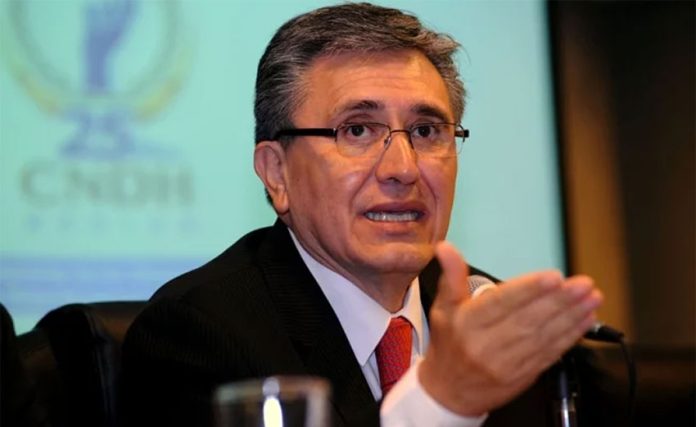The weakness of Mexico’s security and justice institutions has led the country into a crisis, says the departing chief of the National Human Rights Commission (CNDH).
In an interview with the newspaper Milenio just days before he steps down as commission president, Luis Raúl González Pérez said he is concerned and unhappy with the violence and insecurity in Mexico but especially worried about the lack of knowledge the nation’s institutions have demonstrated in their response to the crisis.
González said he will end his five-year term as CNDH president with a range of specific concerns.
Among them: 40,000 people are missing across Mexico, the case of the 43 students who disappeared in Guerrero in 2014 hasn’t been solved and violence against women and journalists remains high.
On the case of the disappearance of the Ayotzinapa Rural Teachers College students, González said that the CNDH provided the government with an “exhaustive line of investigation” to pursue but claimed it has been ignored.
The rights commission head said the nature of the crisis Mexico is going through can be broken down into four pairs of contributing factors: inequality and poverty; violence and insecurity; corruption and impunity; and weakness of the rule of law and weakness of institutions.
The fourth pair has become more pronounced in recent months, González said.
Asked where the government is going wrong in the context of the failed operation to arrest one of El Chapo’s sons and the attack on the LeBarón family that left three women and six children dead, the rights chief responded:
“Since 2006 [the beginning of the so-called war on drugs] security policies haven’t been comprehensive, they haven’t attacked the phenomenon [of violence] in a comprehensive way . . .”
González said the current government has outlined a plan to attend to the causes of violence such as poverty and inequality but needs to implement a broader public security policy.
A good starting point, he said, would be to ensure that all 33 of Mexico’s attorney general’s offices (the federal office and those in the 31 states and Mexico City) are autonomous.
González also said the federal government needs to improve coordination with state governments to ensure that policies on paper are carried out on the ground.
The CNDH chief said that the use of force – which the government is aiming to avoid wherever possible – is permissible as long as it is used in a legitimate, rational and proportional way when the lives of security personnel are at risk.
González added that Mexico should accept the offer from the United States to bolster security collaboration but ensure that it includes measures to curb arms trafficking from the U.S. He said he hoped the United States would not impose a security strategy on Mexico as he claimed it did on migration.
(The government agreed to deploy the National Guard to ramp up enforcement and accept the return of migrants as they await the outcome of their asylum claims in order to stave off President Donald Trump’s threat to impose blanket tariffs on Mexican imports.)
Upon leaving the CNDH, González said he will return to teaching at the National Autonomous University.
On Thursday afternoon, the Senate chose Rosario Piedra Ibarra as the new head of the commission, though without the support of the opposition.
National Action Party senators charged that the commission’s autonomy would be lost under its new chief, claiming she would be acting under the orders of President López Obrador, who has been highly critical of the commission and its departing chief.
Piedra is the daughter of a longtime human rights activist and founder of Comité ¡Eureka!, an organization formed to defend the rights of political activists in the 1970s.
Source: Milenio (sp), Animal Político (sp)
